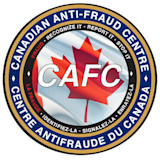
Privacy and security
Making sense of fraud shame: it’s never your fault
Explore the emotional impacts of scams and strategies to cope.
Read article
Canadian Anti-Fraud Centre
www.antifraudcentre-centreantifraude.ca

The Canadian Anti-Fraud Centre (CAFC), the Ontario Provincial Police (OPP) and the Royal Canadian Mounted Police (RCMP) are warning Canadians about the increasing threat of fraudsters impersonating the CAFC and police services. Sometimes, fraudsters are claiming to assist the CAFC with an ongoing investigation using their letterhead and logo as part of the fraud or in other cases, they spoof police phone numbers.
The three most common impersonation scams to look out for include:
The fraudster claims to be from the bank, a major credit card provider or, in some cases, from businesses such as Amazon. They say there are unauthorized charges on your account or that your account is compromised. At times, the fraudster demands that you provide your credit card information and that you send money for reimbursement fees or as bait money to help catch a bad employee.
In order to convince the victim that it's a legitimate investigation, fraudsters send a fraudulent letter via email which may include the CAFC's logo. The letter will advise that the CAFC is investigating and that you, the victim, must cooperate in order to "catch" the suspect. Fraudulent contact information (phone number and email address) is provided so that you communicate with them.
The fraudster claims a virus infected your computer. Fraudsters state that your computer is sending out viruses or has been hacked and must be serviced. They request access to your computer and may run programs or alter settings. Fraudsters will claim that they have found fraudulent activity on your computer and an investigation is required. Victims are contacted by:
Fraudsters send a fraudulent letter via email which may include the CAFC's logo. The letter will advise that the CAFC is investigating and that you, the victim, must cooperate in order to "catch" the suspect. Fraudulent contact information (phone number and email address) is provided for you to communicate with them.
If you have been a victim of a fraud, you may be targeted again with a promise to get your money back. Fraudsters will claim to be from a government agency or law enforcement and ask for your help with a "sting" operation to take down scammers who stole your money.
To convince you that these are legitimate investigations, or that they have found fraudulent activity on your computer, fraudsters send a letter by email which may include the CAFC's logo. The letter will advise that the CAFC is investigating and that you must cooperate to "catch" the suspect. They will provide fraudulent contact information (phone number and email address) for you to communicate with them. They will claim that a payment is required to assist with the investigation and will promise to return the funds, but they never will.
If you believe you have been a victim of these scams or a similar one, immediately contact your bank, your local police and the CAFC.

Explore the emotional impacts of scams and strategies to cope.
Read article
The Canadian Anti-Fraud Centre highlights the most popular holiday frauds.
Read article
Learn how to spot sextortion scams, steps to take if targeted and proactive measures to protect yourself.
Read article